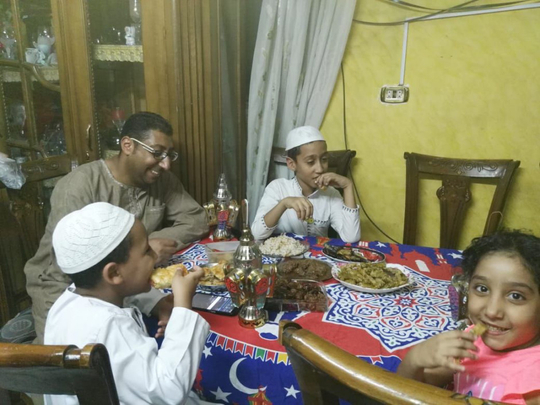
Cairo: Two hours before the iftar time, Hamed Ahmad picked a copy of the Quran from a bedside table. Clad in a flowing comfortable jalabiya, the schoolteacher started reciting verses from the holy book, a tradition he keeps in the timedown of each day in the month of Ramadan.
One hour later, he headed to the kitchen of his third-floor apartment and scrutinised the contents of the iftar meal his wife was briskly making. The aroma of rice-stuffed cabbage and mulukhiyah soup, popular dishes in Egypt, filled the place.
For Ahmad, juicy drinks are a must for breaking the dawn-to-dusk fast in the scorching summer of Egypt.
“As soon as the canon sound booms, signalling the time for iftar, I break my fast with some dates and then gulp down a cup of tamarind,” said the 33-year-old.
Afterwards, Ahmad would leave the dining table for a short break to perform the Maghrib prayer. He would lead his wife and three children in the prayer.
“This what my father used to do practise when I was a child. Now, it’s my turn to do the same with my children,” he told Gulf News.
After the prayer, the family gathers again at the table for the iftar meal — all cooked at home. “These days, who can afford the food deliveries and restaurant meals with expensive price tags?” said Ahmad. “We have not only stopped ordering meals from restaurants, but we have reduced the quantity of food we consume. This is good for both the health and the budget,” he added on a humorous note.
However, his children aged eight, six and five, do not like the austerity. “In the beginning, they protested and cried. I tried to overcome their resistance by occasionally buying them their favourite chocolate and telling them about the health benefits of avoiding gluttony,” he explained. “Also, the recipes of Um Ahmad [the mother of Ahmad] including home-made sweets are irresistible,” he added, using a nickname for his wife, who is a homemaker.
In recent months, Egypt has experienced a wave of price hikes resulting from an ambitious reform programme aimed at healing the country’s ailing economy.
In November 2016, Egypt floated its local pound and cut the state fuel subsidy, steps that unleashed hikes in prices of different goods and services in this country of nearly 95 million people.
The measures secured Egypt a $12 billion loan over a three-year period from the IMF.
Traditionally, Egyptian families stock up on food in the run-up to Ramadan when consumption rises.
“A week before the start of Ramadan, my wife and I sat down and listed our food needs for the blessed month. Then, we went to a major supermarket famous for offering discounts on groceries and bought just what we needed,” Ahmad said.
“Of course, we did not dare to walk into the yamish department because their prices are no longer affordable,” he added, referring to dried fruits including apricots, figs and raisins, associated with Ramadan in Egypt.
“We have replaced them with tamarind, liquorice and hibiscus. They are nourishing after a long day of fasting in summer and cheaper too,” he said.
Pickles are a popular appetiser on the iftar table in Egypt. “They have also joined the list of do-it-yourself,” he added with a grin. “My wife bought some cucumbers, peppers and carrots. Afterwards, she preserved them in a salty solution inside jars weeks before Ramadan. By the time Ramadan started, we had delicious home-made pickles. This is a recipes passed on from our ancestors. ”
Despite his Ramadan cost-cutting, Ahmad was keen to buy each of his three children a fanoos or a lantern to play with in the evenings of the holy month.
“When I was a little child, I liked Ramadan because of the lantern. I used to roam the streets near my house with friends holding the fanoos until the suhour time,” he remembered. “I cannot deprive my children of this joy. But I can’t allow them to go down and play in the street filled with cars and tuk-tuks [motorised rickshaws].”
A Ramadan hallmark Ahmad and many of the middle-class Egyptians now miss is an exchange of iftar invitations as a result of economic hardships.
“In the years before the flotation [of the currency], we used to invite our relatives and friends to have the iftar with us. In exchange, they would invite us. This nice tradition boosted family links and was an opportunity for socialising. Now, it has almost disappeared because of limited budgets,” he said wistfully. “Inviting five people for a good iftar nowadays will cost up to 1,000 pounds [Dh206]. For many people, this almost equals a month’s salary.”












